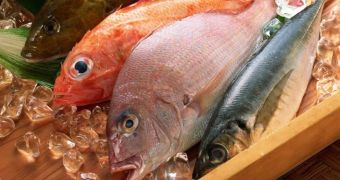This year's April Fools' Day, Greenpeace jokingly warned that, unless folks start taking better care of our planet's seas and oceans, there will come a day when jelly-burgers, jelly-tacos, and other such delicacies are part and parcel of people's everyday diet.
This is because, thanks to climate change, rising sea levels, ocean acidification, the destruction of aquatic habitats, and the overexploitation of marine resources, not all that many fish will be left in the sea for people to pick and choose from.
In a paper published in a recent issue of the journal PLoS (Public Library of Science) Biology, researchers propose that, to show fish how much they love them, and help endangered and vulnerable species make a comeback, folks stop feasting on such marine creatures.
This proposed fish-fast would have to last for several years, during which time wild populations of tuna, swordfish, marlin, and other species that have experienced a troubling drop in their overall headcount in recent years would freely breed and repopulate seas and oceans.
NPR informs that, according to said paper in the journal PLoS Biology, this proposed ban on fishing would apply to international waters, otherwise known as the HS (high seas). Thus, commercial fishing activities would be restricted to coastal areas, or EEZs (exclusive economic zones).
To put things into perspective, it must be said that, presently, EEZs make up about 42% of the ocean. HS, on the other hand, account for 58%. This means that, should this innovative conservation plan come through, a significant part of the ocean would be off-limits to fishermen.
“We find that completely closing the HS to fishing would simultaneously give rise to large gains in fisheries profit (>100%), fisheries yields (>30%), and fish stock conservation (>150%),” the researchers stress in the Abstract to their report in PLoS Biology.
Study author Christopher Costello with the University of California, Santa Barbara, argues that, according to evidence at hand, a 5- to 10-year-long high seas fishing ban should be more than enough for fish swimming in these waters to be able to make a comeback.
“By catching less fish in the short run we'd be able to catch more fish every year on a sustainable basis forever,” Christopher Costello explained in a recent interview with the press. “This has huge implications for food security,” the specialist went on to argue.
It is believed that, should this ban on fishing in the high seas come in place sometime in the near future, it would be possible to make sure that fishermen actually abide by it by using satellites to monitor vessels sailing in these waters and keep tabs on what they might be up to.

 14 DAY TRIAL //
14 DAY TRIAL //